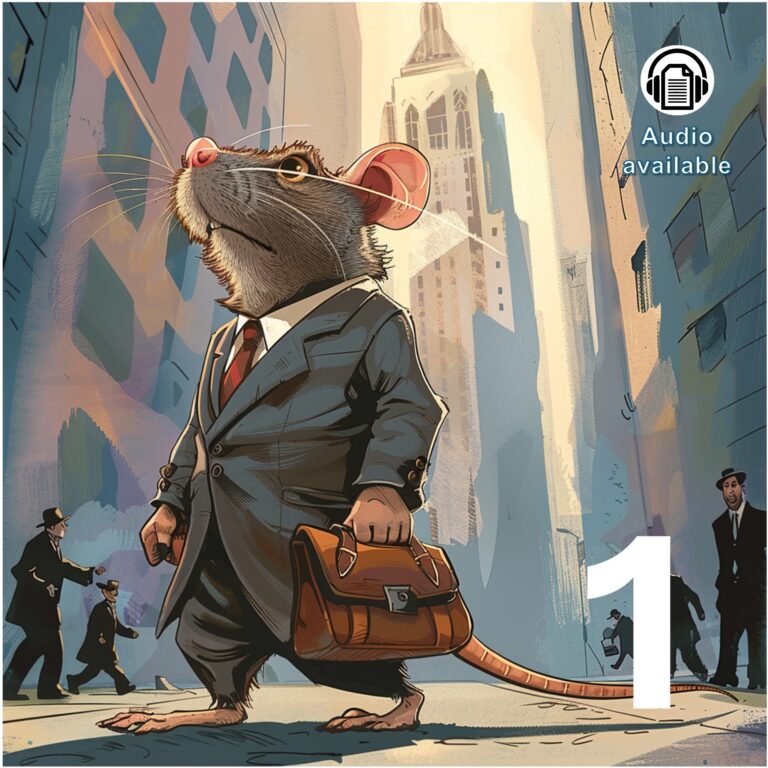SHARE
Financial freedom has always been a very popular phrase in investment circles. Writers and speakers have extensively discussed what financial freedom is, but not so much what it isn’t. I want to share some critical thoughts on the matter. My aim isn’t to deter anyone’s dreams but to offer food for thought. I aim to provide a different perspective on the subject. I aim to ask questions and prompt reflection.
Watch my TEDx talk here

AI and the Hidden Price of Comfort | Nik Popgeorgiev | TEDxFolsom
What if technology gave us everything we wanted—yet left us with nothing to live for? This talk explores the hidden cost of AI-driven automation: the quiet erosion of purpose, meaning, and struggle.
There are two main topics I want to touch on.
The first is related to stress and tension that the pursuit and dream of financial freedom can bring. The second topic concerns what you should expect and what others expect from you if you want to achieve this goal.
Part 1 – Stress and Tension
The psychological aspect of investing and the feelings we experience while investing are often underestimated or completely ignored. However, by paying attention to these questions and reflecting on them, we can uncover some hidden possibilities and better understand why we act in certain ways. The more we know ourselves, the more successful we will be in everything we do, including our financial activities. Investing is very much a competition, and any advantage we can get is welcome. Let’s look at the use of this phrase “financial freedom” in terms of what psychological processes it evokes in people.
Whether you realize it or not, the words ‘freedom‘ and ‘independence‘ create a certain burden in this phrase. Achieving financial freedom is a future process, but it can make us feel like prisoners and financially dependent in the present. For some, this motivates action; for others, it brings negative feelings and pressure. This can lead to dissatisfaction with our current lives, even if they’re good enough. We connect our lives with limited possibilities and dependence unintentionally. As a result, an illusory contrast forms between our current lives and our dreams, leading to dissatisfaction.”
Imagine that you happen to be in the company of financially independent people whose capabilities significantly exceed yours. In their company, you witness talks about exotic journeys, expensive acquisitions, and luxury experiences you can’t afford. You listen, and thoughts like “And I have to be in the office on Monday morning ” are running through your head . You are likely to get depressed. It’s just the way the human brain works.
Social Comparison and Status Anxiety
There are mind states, well studied and described in psychology, in which we can fall, for example “social comparison ” This is a process in which we unconsciously compare our abilities with those of other people. And since your entire wealth probably equates to one of their expensive toys, it discourages you.
Another psychological process that goes hand in hand with such situations is the so-called ” anxiety about social status ” . Wealth is one of the ways to assert ourselves in society, and it demonstrates the success we have achieved. Comparing yourself to the rich makes you feel like a failure, or at least not as successful as them. It can also be hurtful and discouraging.
“Fear of Judgment” is a psychological phenomenon where you may feel anxious or self-conscious around wealthy individuals, worrying that they might view you as less capable or resourceful because you haven’t amassed similar wealth. This concern stems from the fear that they will judge you unfavorably compared to their own financial successes.
Impact of Media and Inspirational Literature
So, when you’re constantly bombarded with articles, stories, and media that glorify achieving financial freedom, it’s challenging not to feel influenced. Every investment site, advertisement, or podcast echoes this sentiment, making your standard 8-to-5 job appear less appealing. This constant exposure can transform the dream of early retirement into a source of stress and fixation, making you question the value of your current lifestyle.
The “Rat Race”
Let’s explore another, even more thought-provoking term tied to the concept of financial freedom. If you’re involved with or have an interest in investing and finance, you’re likely familiar with “The Rat Race.” This phrase gained traction in the early part of the last century through American literature, bringing to mind the following verse:
“Every day in the world’s great rat race
Millions of creatures with fur or with a face
Fight for existence in a mad, jumbled race.”
The term “The Rat Race” describes how the working class often feels stuck. They work hard just to make enough money to pay for their basic living costs, and it seems like they can never break out of this cycle to try other things life has to offer. They are trapped in a constant struggle just to get by.
Books designed to inspire you to break free from the grind commonly feature both the terms “financial freedom” and “Rat Race”. While authors intend these messages to be motivational, they often convey an underlying implication that isn’t beneficial to everyone. Consider the imagery involved: firstly, the label of being a “rat”—an animal associated with sewers, monotony, and limitation. Secondly, the suggestion that you’re trapped in a metaphorical maze, manipulated by forces greater than yourself. Whether you like it or not, the term “Rat Race” might provoke feelings of anger or discontent with your life, as if you’re merely a lab rat in an experiment. This can become a source of deep frustration.
Influence of Inspirational Literature

One well-known book that employs this type of motivational language is Rich Dad Poor Dad by Robert Kiyosaki. This bestseller has been a powerful catalyst, motivating many towards financial freedom. However, its approach can be overwhelming for those who are not inherently entrepreneurial. Although the book never explicitly labels anyone a “rat,” the frequent use of the term “Rat Race” can implicitly make non-entrepreneurs feel devalued. Kiyosaki’s provocative style is intended to challenge readers, but it may also induce feelings of helplessness or despair in those who find his recommended strategies unattainable. This can leave some readers feeling discouraged, particularly if they believe they cannot apply his advice to their own lives.
Maintaining Perspective
The desire to improve your financial situation is natural and human. The point is to develop in an appropriate atmosphere, state of mind, attitude and with a good understanding of the circumstances surrounding its achievement. Free yourself from excessive expectations , because these days, they seem to hang over us with a huge weight. Not every rat has to turn into a tiger, and it doesn’t have to. It is important that if you follow this dream, you do it with a smile and desire, without starting to feel negative about your life at the given moment. Financial freedom should not be an escape from your current life, only an attempt to improve it. It will not bring happiness if you miss it at this moment.
The “Ordinary People“
On the other hand, it’s crucial to acknowledge the essential role of what are often dismissively called “ordinary people” (or, more ironically, “rats” or “financial prisoners”). These individuals are the engine of our society, driving progress and powering the machinery of daily life. They build the foundations of our world with their everyday efforts. Is it realistic to expect that everyone on Earth will achieve financial independence and retire early at 50, 40, or even 35? If that were to happen, who would remain to do the work? Who would build our bridges, construct our buildings, and make daily improvements to our world?
If those in the engine room ascend to the captain’s deck, the ship would cease to move forward. Thus, there is significant value in finding satisfaction with our roles without constant regret that we are not the captain. There is a certain beauty in being part of the collective that, like ants, builds tirelessly each day. This doesn’t require global recognition or a life of luxury, but rather, it involves living quietly with ambitions that are fulfilling without being overwhelming or oppressive.
Challenges of Finding Satisfaction
Many people express dissatisfaction with their jobs, and the concept of financial freedom often becomes increasingly appealing to them. However, this is often an illusion that distracts from the real issues at hand. Waking up each morning and wondering, “When will I finally achieve financial freedom so I don’t have to go to work anymore?” indicates a need for change in your life. Is your job unfulfilling? Consider seeking a new one. Are your colleagues causing frustration? It might be time to look for a different position.
Is waking up early a challenge? Explore opportunities that offer different shifts or remote work options. Are finances a concern? Invest in further education or training to enhance your skills, or devise a short-term financial plan to improve your situation. Take proactive steps to create a satisfying environment for yourself rather than pinning your hopes on the elusive promise of financial freedom, which purports to solve your current frustrations but remains a distant and uncertain goal. Financial freedom is not an immediate escape, a cure-all, or a magical transformation for your current lifestyle.
The Ethical Dimension
Consider this alternative perspective: Our planet’s resources are finite, making our system inherently closed. Choosing not to work can indirectly burden others who must compensate for your lack of contribution. Seeking not to work may grant you privilege at others’ expense. While you may find this view harsh and disagree with it, reflecting on it is valuable.
Moreover, consider the ethical dimension: while some seek financial independence to evade early mornings, global inequalities persist, like African children enduring extreme deprivation. While it’s vital not to overstate this comparison, it does provide a grounding perspective to assess life as a member of the financially dependent working class. Your life might already be fulfilling, and the pursuit of escape from this reality might be less necessary than it appears.
Managing Expectations
Not everything in life is meant to happen, and unmet expectations shouldn’t be seen as failures or misfortunes. I have personally experienced these intense feelings of desire and expectation, grappling with concerns about how others perceive my success and how I view myself. Over the years, I have learned to cultivate gratitude for what I have, recognizing that pursuing ambitions should not come at any cost. This mindset has allowed me to live with much greater peace.
Acknowledging Realistic Possibilities and Social Comparisons
Realistically, not everyone possesses the will or the necessary qualities to achieve their dreams, and being labeled as a failure by society can be frustrating. As I conclude this part, I want to highlight that the most famous and successful individuals often dominate our newsfeeds and social media, which skews our perception. This leads to unhealthy social comparisons. Consider the likelihood of becoming the next Bill Gates or Elon Musk, or the next Mark Zuckerberg—these probabilities are incredibly slim. Yet, the media’s focus on these exceptional cases, rather than on ordinary individuals, prompts us to make comparisons that can again lead to dissatisfaction and distress.
Balancing Tension and Relaxation
The question arises: “Which is more beneficial — tension or relaxation?” Which state do you think offers a better chance of success when we clearly understand our objectives and are actively striving toward them? I believe that approaching our goals with calmness and without discontent, and without pressuring one another, enhances our chances of making further progress. In this context, the essence of this article is not defeatist. It’s not advocating that we should content ourselves with mediocrity in the race for financial success, like settling for 8th, 18th, or 50th place. Instead, it encourages us to aim for first place, but to do so without the burden of a heavy psychological load that could hinder our steps at every turn. It’s also crucial to approach our current position with greater calmness.





